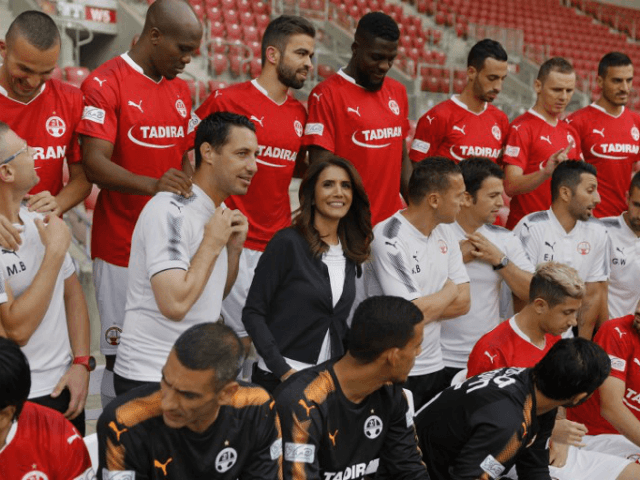BEERSHEBA (AFP) — The desert city of Beersheba in southern Israel may seem to have little in common with the gleaming capitals of Europe, but for the third year running its soccer club is to play in the UEFA Champions League.
The success of Hapoel Beersheba owes much to its pioneering female owner, Alona Barkat.
Barkat, who rarely misses her team’s games, will once again be one of the few females with a team in the competition.
Other women who have been involved in high-level soccer include Chelsea director Marina Granovskaia, nicknamed the London club’s “iron lady.” Chelsea did not qualify for the Champions League this year.
In France, Margarita Louis-Dreyfus took over ownership of France’s Olympique de Marseille club from her late husband in 2009 but threw in the towel in 2016.
Barkat became the first woman to own a professional soccer club in Israel when she bought Hapoel Beersheba in 2007 with the support of her husband Eli Barkat, a high-tech businessman.
She admits that she knew little or nothing about the game at the time.
She was also not familiar with Beersheba, having returned a few years earlier from a stay in the United States, where her husband made a fortune in high-tech, in partnership with his brother, outgoing Jerusalem Mayor Nir Barkat.
Hapoel Beersheba were at the time struggling in the second division and playing in a dilapidated stadium, a far cry from its glory days of the 1970s.
They returned to Israel’s premier league in 2009 and in 2016 won their first national title in four decades.
They repeated the feat in 2017 and 2018.
And while the soccer world has its eyes riveted on the World Cup being played in Russia, the small Israeli club will face Estonian champion Flora in their opening first qualifying round Champions League game in Tallinn on July 10.
‘Work and patience’
At the beginning, “it was difficult, just like in any work you are doing,” she said during a recent team photo shoot at the renovated, ultra-modern Turner Stadium inaugurated in 2015.
“Every area where you come and you start working, it’s hard — and regardless of whether you are a man or a woman, it’s hard.”
Her reserved smile contrasted with the exuberance of the players gathered around her.
She says she had hoped in 2007 that the team would become national champions, but she also had her sights on wider issues.
Beersheba is the fourth-largest urban center in Israel, but it traditionally has not been the city that comes to mind when talking about the “start-up nation,” the phrase often used to describe the country’s success in the high-tech industry.
But over the course of recent decades, the ancient city which became a new home for Jewish migrants — mostly from North Africa — has grown to 200,000 residents and undergone a transformation.
Israel is seeking to reinvent the city as a center for cybersecurity and an incubator of industry talent.
It has a vibrant university and the Israeli army’s school of technology, and is in the process of rehousing the intelligence corps as the military sells off its high-value real estate in the crowded center of the country.
‘Everyone can succeed’
“The reason I came here (Beersheba) is because for me it was very important to emphasize that every person can succeed everywhere,” she said.
She said she considers Hapoel Beersheba as not only a soccer club, but also a bridge to bring together people of different religions and economic backgrounds.
Under her leadership, the club has invested heavily in local youth.
It sponsors four specialized centers for disadvantaged children who receive training from club staff.
Relations with dissatisfied supporters have also calmed noticeably, sports journalists say.
She downplays the significance of her position as a woman in an industry traditionally dominated by men.
“At first I’m sure some people didn’t know how to accept it,” Barkat, who is in her 40s, told AFP.
“But I think along the way people truly test you and want to know what you are doing and what message you deliver. At the end of the day, I think it’s not an issue anymore.”
She added: “I think every person should do what they want and they should do what their dreams are and try to fulfill them,” she said.
“And that’s what I’m trying to do and I hope the others will follow.”
Hapoel’s striker Ben Sahar said she “gives us everything we need. She lets us get on with our work and does a lot behind the scenes.”
“She was very successful in winning respect in this male environment,” he added.
On the question of how to reconcile work and family demands Barkat says that has not been a problem for her sons — aged 25, 22 and 17.
“I was very lucky: My three boys love their mother’s job,” she says.

COMMENTS
Please let us know if you're having issues with commenting.